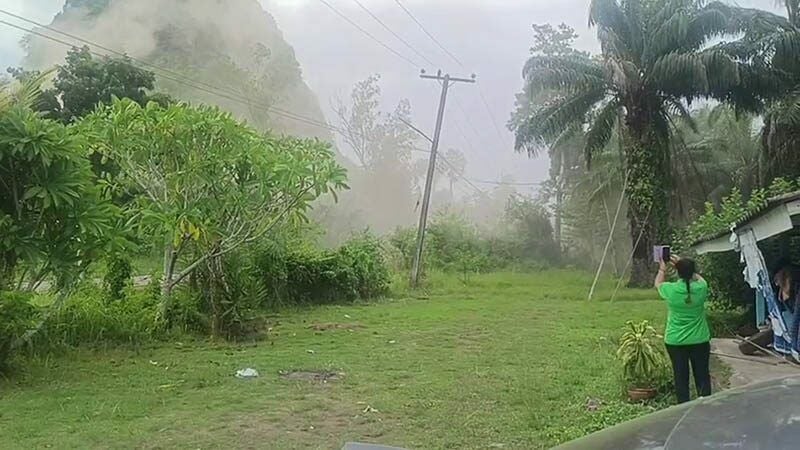Chumphon residents force asphalt factory closure over decade-long pollution

Residents of Chumphon have taken decisive action to close an asphalt factory due to persistent odours and dust that have plagued their community for over a decade. Despite previous complaints and promises of resolution, the problems have persisted, prompting renewed protests.
Yesterday, October 9, approximately 50 residents from several villages in Saphli Subdistrict, Pathio district, Chumphon province, gathered in front of the asphalt mixing plant on the Saphli-Thung Wua Laen Road. Led by 49 year old Akkarat Chanthap, and 53 year old Pradit Niamsuwan, the group displayed signs expressing their grievances. The factory, one of three in the area, has been a constant source of pollution and health issues for the local community.
The factory is surrounded by a 2-metre-high green zinc fence, topped with green mesh fabric, extending to a total height of 4 metres and a length of 100 to 150 metres. Protest signs read, “Foul smell, get out now!” “Asphalt is a deadly cancer in our community, help us!” “Give us back our clean air!” “You live comfortably while we slowly die.”
Akkarat and the residents revealed that the community has suffered for over 10 years since the factory’s establishment. They have lodged numerous complaints and held meetings with factory representatives and relevant officials.
Although the factory initially promised improvements, the issues of foul odours and dust quickly resurfaced. The community has documented their grievances and held meetings at the village and subdistrict levels.
The most severe problems include the pungent smell of burning asphalt or oil, which reaches local temples, schools, and childcare centres. This has led to respiratory illnesses, particularly among children, the elderly, and bedridden patients, some of whom have required hospitalisation.
Asphalt pollution
The residents have repeatedly given the responsible officials opportunities to resolve the issues but to no avail. They argue that the factory should be permanently shut down due to its continuous negative impact on their lives.
The residents marched to the Saphli Subdistrict Administrative Organisation (SAO), located about 1 kilometre from the factory, to submit another complaint to Nikorn Khongkhamlang, the SAO President.
Nikorn acknowledged the ongoing problem and stated that he had previously instructed officials to coordinate with village leaders to address the issues. He had assigned the SAO deputy to oversee the matter, with plans to form a committee to discuss the details.
However, the residents expressed dissatisfaction, insisting that forming another committee was unnecessary given the long-standing nature of the problem. They urged the SAO President to use his authority to take immediate action. Nikorn then delegated the task to Watcharin Suwapit, the SAO deputy, who initially faced resistance from the residents.
Akkarat and the group argued that the factory had caused distress for over 10 years and accused the officials of neglect. They demanded that the factory cease operations immediately.
Watcharin eventually agreed to temporarily halt the factory’s operations to address the odour and dust issues, pending an inspection by relevant agencies. If the problems are resolved, the factory may resume operations.
Watcharin disclosed that since the issues first arose, the SAO, in collaboration with public health and industry officials, had inspected the factory and ordered improvements. The factory claimed to have made necessary changes, including replacing filters and materials. However, the community continued to report adverse effects, prompting further discussions with the factory operators.
He added that the SAO would issue an indefinite suspension order until the factory resolves the issues. While the SAO lacks the authority to permanently close the factory, they understand the residents’ concerns and will enforce the temporary halt.
Akkarat expressed partial satisfaction with the decision to suspend the factory’s operations, noting that it would at least temporarily alleviate the pollution. However, he warned that if the odours return, the community will unite once again to combat the factory’s harmful emissions, reported KhaoSod.
Saphaporn, another affected resident, took reporters to her home to show the impact on her bedridden mother, 67 year old Chuchip, who suffers from the factory’s odours. Her father constantly uses herbal inhalers to mitigate the smell. Many families in the community face similar hardships due to the factory’s emissions.
Latest Thailand News
Follow The Thaiger on Google News:


























